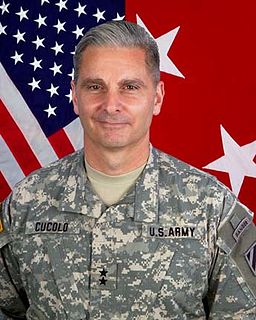
George Catlett Marshall Jr. was an American army officer and statesman. He rose through the United States Army to become Chief of Staff under Presidents Franklin D. Roosevelt and Harry S. Truman, then served as Secretary of State and Secretary of Defense under Truman. Winston Churchill lauded Marshall as the "organizer of victory" for his leadership of the Allied victory in World War II. After the war, he spent a frustrating year trying and failing to avoid the impending civil war in China. As Secretary of State, Marshall advocated a U.S. economic and political commitment to post-war European recovery, including the Marshall Plan that bore his name. In recognition of this work, he was awarded the Nobel Peace Prize in 1953.

Fort George G. Meade is a United States Army installation located in Maryland, that includes the Defense Information School, the Defense Media Activity, the United States Army Field Band, and the headquarters of United States Cyber Command, the National Security Agency, the Defense Courier Service, Defense Information Systems Agency headquarters, and the U.S. Navy's Cryptologic Warfare Group Six. It is named for George G. Meade, a Union general from the U.S. Civil War, who served as commander of the Army of the Potomac. The fort's smaller census-designated place includes support facilities such as schools, housing, and the offices of the Military Intelligence Civilian Excepted Career Program (MICECP).

The Harvard Kennedy School is the public policy school of Harvard University in Cambridge, Massachusetts, US. The school offers master's degrees in public policy, public administration, and international development, four doctoral degrees, and many executive education programs. It conducts research in subjects relating to politics, government, international affairs, and economics. As of 2019, HKS had an endowment of $1.3 billion. The School is a member of the Association of Professional Schools of International Affairs (APSIA), a global consortium of schools that seeks to train leaders in international affairs.

The Distinguished Service Cross (DSC) is the United States Army's second highest military decoration for soldiers who display extraordinary heroism in combat with an armed enemy force. Actions that merit the Distinguished Service Cross must be of such a high degree that they are above those required for all other U.S. combat decorations, but which do not meet the criteria for the Medal of Honor. The Army Distinguished Service Cross is equivalent to the Navy and Marine Corps' Navy Cross, the Air Force and Space Force's Air Force Cross, and the Coast Guard Cross. Prior to the creation of the Air Force Cross in 1960, airmen were awarded the Distinguished Service Cross.

The Walter Reed Army Medical Center (WRAMC) – known as Walter Reed General Hospital (WRGH) until 1951 – was the U.S. Army's flagship medical center from 1909 to 2011. Located on 113 acres (46 ha) in the District of Columbia, it served more than 150,000 active and retired personnel from all branches of the military. The center was named after Major Walter Reed (1851–1902), an Army physician who led the team that confirmed that yellow fever is transmitted by mosquitoes rather than direct contact.
A "V" device is a metal 1⁄4-inch (6.4 mm) capital letter "V" with serifs which, when worn on certain decorations awarded by the United States Armed Forces, distinguishes an award for heroism or valor in combat instead of for meritorious service or achievement.

The Combat Capabilities Development Command (CCDC) C5ISR Center, formerly the Communications-Electronics RD&E Center (CERDEC), is the United States Army information technologies and integrated systems center. CCDC C5ISR Center is headquartered at Aberdeen Proving Ground in Maryland, with activities at Fort Belvoir in Virginia and Joint Base McGuire-Dix-Lakehurst in New Jersey.

David Howell Petraeus is a retired United States Army general and public official. He served as Director of the Central Intelligence Agency from September 6, 2011, until his resignation on November 9, 2012. Prior to his assuming the directorship of the CIA, Petraeus served 37 years in the United States Army. His last assignments in the Army were as commander of the International Security Assistance Force (ISAF) and commander, U.S. Forces – Afghanistan (USFOR-A) from July 4, 2010, to July 18, 2011. His other four-star assignments include serving as the 10th commander, U.S. Central Command (USCENTCOM) from October 13, 2008, to June 30, 2010, and as commanding general, Multi-National Force – Iraq (MNF-I) from February 10, 2007, to September 16, 2008. As commander of MNF-I, Petraeus oversaw all coalition forces in Iraq.

The U.S. Army John F. Kennedy Special Warfare Center and School (SWCS) – known informally as "Swick" – primarily trains and educates United States Army personnel for the United States Army Special Operations Command (USASOC) and United States Special Operations Command (SOCOM), which includes Special Forces, Civil Affairs, and Psychological Operations personnel. Its purpose is to recruit, assess, select, train and educate the U.S. Army Civil Affairs, Psychological Operations and Special Forces Soldiers by providing training and education, developing doctrine, integrating force-development capability, and providing career management.

Lieutenant General Ronald Lee Burgess Jr., United States Army is a retired United States Army Lieutenant General. His last military assignment was as the 17th Director of the Defense Intelligence Agency and Commander of the Joint Functional Component Command for Intelligence, Surveillance and Reconnaissance (JFCC-ISR). Prior to that, he was Director of the Intelligence Staff in the Office of the Director of National Intelligence.

The reorganization plan of the United States Army is a current modernization (2017-2028) and reorganization (2006-2016) plan of the United States Army that was implemented (2006-2016) under the direction of Brigade Modernization Command. This effort formally began in 2006 when General Peter Schoomaker, was given the support to move the Army from its Cold War divisional orientation to a full-spectrum capability with fully manned, equipped and trained brigades; this effort was completed by the end of 2016. It has been the most comprehensive reorganization since World War II and included modular combat brigades, support brigades, and command headquarters, as well as rebalancing the active and reserve components. The plan was first proposed by the Army's 34th Chief of Staff, Eric Shinseki, in 1999, but was bitterly opposed internally by the Army. By 2020, the Army's 40th Chief of Staff was calling for transformational change, rather than incremental change by the Army. In 2021, Gen. McConville, the Army's 40th Chief of Staff, laid out Aimpoint 2035, a direction for the Army to achieve Corps-level Large-scale combat operations (LSCO) by 2035, with Waypoints from 2021 to 2028.

The Institute of World Politics (IWP) is a graduate school of national security, intelligence, and international affairs in Washington, DC and Reston, VA. Founded in 1990, it offers courses related to intelligence, national security, and diplomatic communities.

The Assistant Secretary of the Air Force (SAF/AQ) is a civilian position in the Department of the Air Force that is appointed by the President of the United States and confirmed by the United States Senate. This position is established under Title 10 US Code Section 9016 and is one of five Assistant Secretary positions under the Secretary of the Air Force. The Assistant Secretary reports to the Secretary of the Air Force.

Anthony Arthur "Tony" Cucolo is a retired United States Army Major General. He was notable for his service as the Army's Chief of Public Affairs, commander of the 3rd Infantry Division and Fort Stewart/Hunter Army Airfield, Georgia, and commandant of the Army War College at Carlisle Barracks, Pennsylvania.

Robert Louis Caslen Jr. is a retired United States Army officer who served as the 59th superintendent of West Point from 2013 until 2018 and as the 29th president of the University of South Carolina from July 2019 until May 2021. Between January and May 2019, Caslen was senior counsel to the president and interim chief financial officer at the University of Central Florida. On July 19, 2019, the Board of Trustees of the University of South Carolina elected him as the school's 29th president, a position he assumed on August 1, 2019. Caslen also served as HigherEchelon's Special Advisor on Executive Leadership and Character Development. He resigned as President at South Carolina on May 12, 2021.

Judd Henry Lyons is a retired Army National Guard officer. After retiring from the military the rank of major general, he was appointed to the Senior Executive Service on August 7, 2017. Since 2018, he has served as Deputy Assistant Secretary of Defense. In this role, he is the principal advisor to the Assistant Secretary of Defense for Manpower and Reserve Affairs in support of the ASD's role of providing overall supervision of manpower and reserve affairs for the Department of Defense. He is responsible for both the integration of reserve affairs across the United States Department of Defense and strategic engagement on all Reserve Component matters.
Henry Muller may refer to:

United States Army Futures Command (AFC) is a United States Army command aimed at modernizing the Army. As of 2018 it was focused on six priorities: long-range precision fires, Next Generation Combat Vehicle, future vertical lift platforms, a mobile & expeditionary Army network, air & missile defense capabilities, and soldier lethality. AFC's cross-functional teams (CFTs) are Futures Command's vehicle for sustainable reform of the acquisition process for the future.















